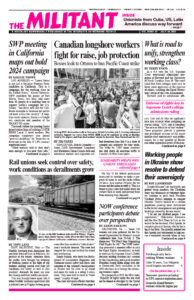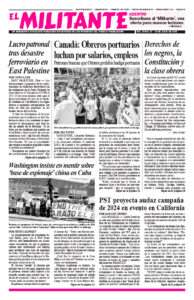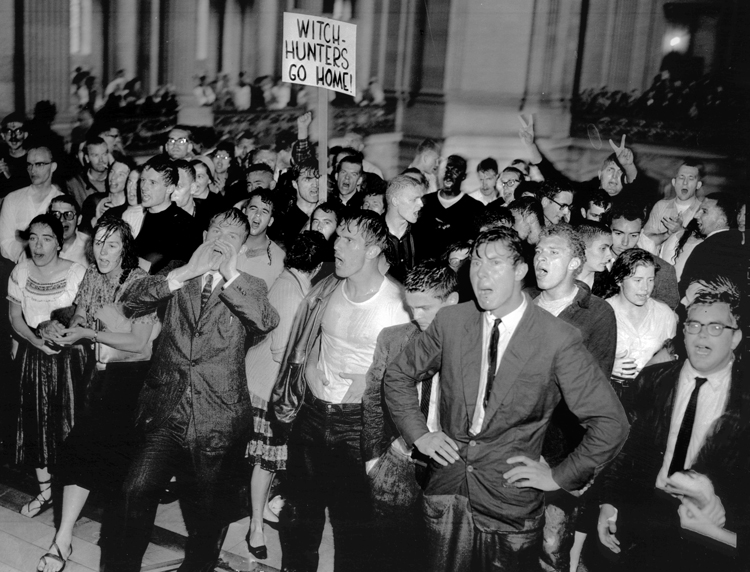One of Pathfinder’s Books of the Month for July is Labor’s Giant Step — The First Twenty Years of the CIO: 1936-55 by Art Preis. Out of his experiences in the labor battles of the 1930s, Preis became a staff writer for the Militant. His book deals with those great class-struggle upheavals, out of which strong industrial unions were built. This excerpt from “The witch hunt and labor struggles” describes how all wings of capitalist politics embraced McCarthyism to target the labor movement, trampling on constitutional rights. Copyright © 1972 by Pathfinder Press. Reprinted by permission.
The assault on the organized workers during the first Eisenhower administration was primarily one which came under the heading of “McCarthyism.” All wings and tendencies of capitalist politics, the Democratic liberals in Congress included, vied in a campaign of political terrorism disguised as anti-communism. The stifling atmosphere of intimidation created by threat of the communist smear, which was McCarthy’s specialty, was thickened by new repressive legislation and direct victimization.
Behind the general smoke screen of anti-communism, one of the most sinister anti-union bills was introduced into the Senate in April 1953 by Senator John Marshall Butler, Maryland Republican. He had been elected with Senator Joseph McCarthy’s direct aid. Butler’s bill required the National Labor Relations Board to deny collective bargaining recognition or elections to any union under “investigation” by the Subversive Activities Control Board set up under the McCarran-Kilgore Act of 1950. Such investigation and denial of NLRB certification were to be based on any employer’s mere complaint that a union seeking collective bargaining rights was “communist dominated.” If the Subversive Board should “find” against the union, the latter would be permanently banned by the NLRB unless and until such a ruling was reversed by a regular federal court.
On November 1, 1953, the special Senate Internal Security subcommittee, headed by McCarthy’s protege, Senator Butler, opened hearings on “Communist penetration of our trade unions.” The targets of this inquisition, it was announced, were several of the independent unions which had split from the CIO in 1950, including the United Electrical Workers and the Mine, Mill and Smelter Workers, engaged at the time in conflicts with large corporations. McCarthy carried out one of his highly publicized and televised inquisitions of alleged Communists in General Electric plants in Massachusetts. Among those who received the stigma of his wild charges and innuendo-loaded questions were local officers of the CIO International Union of Electrical Workers.
McCarthy also conducted a smear hearing, February 19 and 20, 1954, in Albany, New York, on alleged subversive activity by the independent United Electrical Workers in General Electric’s Schenectady plant. Hundreds of union workers traveled to Albany at their own expense and the loss of a day’s pay to voice their opposition. “The workers jammed the hearing room and hundreds more milled through the corridors and outside the building,” reported Harry Ring in The Militant. “They booed and jeered McCarthy’s tirades and shouted approval of seven subpoenaed GE workers who defied the witch-hunters. Workers in the corridors held aloft for photographers an outsized valentine inscribed: ‘GE Loves McCarthy.’”
A Negro worker, amid vigorous applause, turned the attack on McCarthy and denounced him. When McCarthy tried to intimidate this witness, he shouted back: “Go down South and subpoena Governor Byrnes and Talmadge. Yes, subpoena those enemies of my people, of America. Why don’t you investigate subversion by GE, of the Jim Crow system, of the profits taken from the sweat of my people? You fascist bum, why don’t you investigate that?”
Ring further reported: “When the seventh witness leaned forward in the stand to tell him, ‘I don’t want to be framed. I will rest upon the Fifth Amendment which guarantees that innocent people be protected,’ McCarthy suddenly announced that he had received an ‘urgent’ phone call from New York City and abruptly ended the hearings. He left the courthouse with the boos of the audience ringing in his ears.” He never went back.
A companion offensive against unions was unloosed by the House Un-American Activities Committee. The latter group, headed by Congressman Harold H. Velde, a Republican, ran into an unforeseen obstacle when it barged into San Francisco to open a “subversive” hearing in City Hall. Some 6,000 members of Local 10, ILWU (independent), “hit the bricks” on December 3, 1953, to protest Velde’s investigation. The waterfront was paralyzed. The CIO Council in the East Bay area denounced the Velde committee as an enemy of democratic rights. The hearings were flooded with “unfriendly witnesses” and “unfriendly” spectators. Scheduled to last 11 days, the hearings were hastily terminated after five days. Velde retreated ignominiously. At the first real resistance by organized labor, the government witch-hunters had to cut and run.
Unfortunately, the top labor leaders did little more than whine that McCarthy, Velde and the like were not “really interested in suppressing communism.” That objective, it appeared, was “sincerely” desired by the Democratic liberals in Congress, the traditional “defenders” of civil liberties and labor’s rights. …
It is an irrefutable fact that the New Deal-Fair Deal liberals were the chief authors and sponsors of the first federal laws to (1) make mere opinion a crime (the Smith Act of 1940, rushed through by a Democratic Congress and signed by President Roosevelt); (2) establish concentration (detention) camps in America where political dissenters can be imprisoned without trial during a “national emergency” (McCarran-Kilgore Internal Security Act of 1950); and (3) outlaw a political party (Communist Control Act of 1954).


